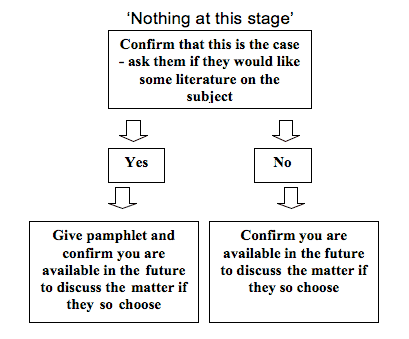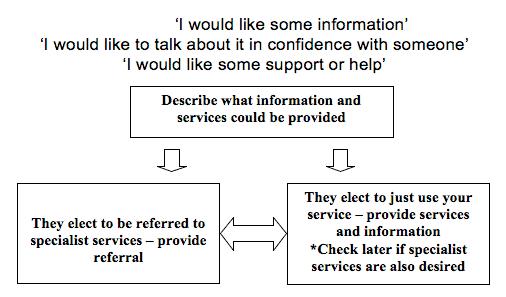Addiction services have historically focussed upon providing help for those exhibiting problem gambling behaviour. However, often overlooked is that their family/whanau experience as much or more financial hardship, as the person who has the gambling problem. For many families, the continual stress of living with emotional and financial uncertainty results in poor mental health, with conditions such as major depression, anxiety disorders and suicidal ideation being almost as commonplace as for those who have the gambling problem. The Australian Productivity Commission identified in 1999, that each problem gambler adversely affected at least seven others. Nevertheless, family/whanau of problem gamblers comprise only a fraction of the numbers of problem gamblers who seek help. In 2003, barely 30% of first time calls to the national helpline came from significant others while face to face counselling statistics revealed that only 20% of clients were family members, confirming that as with other countries, help-seeking by family members in New Zealand is proportionately well below the expected needs.
Identifying and minimising the harm caused by gambling to family/whanau is recognised in the new Gambling Act. However, for possibly a range of reasons, help-seeking for these people remains low. This suggests that to minimise harm for this significantly larger group than problem gamblers, a proactive approach is warranted. Recent screening projects of at-risk groups within New Zealand have identified substantial numbers of family members adversely affected by another’s gambling.
How does problem gambling affect the family/whanau?
Problem gambling can consume vast amounts of money over a very brief period. Even a five-cent gambling machine can consume hundreds of dollars in an hour. As larger bets and/or longer gambling sessions develop, demonstrating a form of ‘tolerance’, the person gambling needs to access money from new and sometimes unauthorised sources. Multiple credit cards, bounced cheques, personal loans, mortgages and ‘borrowings’ from work money can very quickly exceed the ability to repay. The fear of criticism, disclosure, family arguments compounded with shame, guilt and past lies, often means that the family does not become aware of the level of debt until late stage problem gambling.
This can, for the family/whanau, result in:
- Shock and anxiety for the family’s immediate and future financial security, and change in status
- Shame around the public perception of the family and their predicament
- Depression around ability to solve apparent unsolvable problems and loss of motivation
- Loss of trust caused by the deceit
- The ending of relationships and stresses associated with this
- May result in violence between the gambler and partner/spouse
- Loss of guidance and focus on children of the family as the partner becomes overly focused on trying to control the gambler’s behaviour
- Loss of employment for the gambler and income for the family
- Health problems resulting from unrelenting stress on the family
- Control issues by the gambler over the partner/spouse that isolates the family from help
- Suicidal ideation/attempt by the partner/spouse or guilt as a result of the gambler’s suicidal ideation/attempt
- Uncertainty as to where to seek help due to a complex mix of effects, with focus upon finances and disconnection from or devaluing their own health needs
A screen developed to identify those affected by another’s gambling
As has been described, concerned others may be affected by problem gambling in a range of ways, including their personal health, their relationships with others, intergenerational consequences and consequences for society as a whole.
Families suffer financial, physical and emotional problems; spouses suffer a range of health problems including chronic/severe headaches, stomach disorders, breathing difficulties and light-headedness, depression, feelings of anger and isolation (NRC, 1999) or may be physically abused (Lorenz et al 1993; Bland et al 1993). Children of problem gamblers were more likely to smoke, drink alcohol and misuse drugs, and describe their childhood as unhappy (Jacobs et al 1989) while frequently reporting anger, sadness and depression (Lesieur et al 1989) or physical abuse (Bland et al 1993). A study of NZ General Practitioner patients (n=752) found that 40% of patients who were not problem gamblers themselves, knew of problem gamblers who were friends or family members (Sullivan 1999).
There is often shame and guilt experienced by the concerned other as a result of either harbouring a belief that they are contributing to the gambler’s behaviour, having ‘family secrets’ around the gambling through borrowing from relatives or friends for ‘other’ reasons, or around protecting the gambler/family from creditors or criticism.
How can the Concerned Others' Gambling Screen assist?
Screens can elicit a true response if provided in a safe and appropriate environment. This screen is described as a health survey for the concerned other; the health perspective can help in avoiding the focus on behaviour that the person may be either ashamed or protective about. The responses to choose from are broad, and even if the person chooses incorrectly to not disclose, it may ‘sow a seed’ around the effects on themselves of the gambler’s behaviour, instead of the focus (often) on the gambler. Also, if offered in a health environment there will be an expectation that such questions around health will be asked. Other suitable environments may be budgeting, refuges, employee assistance programmes, family counselling, and many others.
The screen questions
The screen comprises just three questions in order to encourage participation and utilisation. The first question is a cut-out question which enables those not affected to discontinue with the screen. Those uncertain, affected in the past or currently, continue to the second question.
The second question encourages thought around the effects of another’s gambling on themselves and enables a range of responses including ‘uncertain’ that may foster further thought. A multiple response is also available.
The third question allows the person to indicate the assistance they would like. It is client centred and includes the ability to decline assistance. Hopefully this freedom to choose not to seek help will allow the perception that a truthful answer is available without the expectation of pressure to address the response there and then.
Intervention responses to the screen
The appropriate interventions to the screen responses are best initially determined in reverse order, namely from the responses to question three. Follow the algorithm below (if questions two and three are unanswered then this may be due to a ‘no’ cut-out answer for question one)
Question three responses:


Question two responses:

Question one responses:

|
Concerned Others' Gambling Screen (COGS Mk 2 version)
Developed by Dr Sean Sullivan
ABACUS Counselling Training & Supervision Ltd
View / Download
|
|